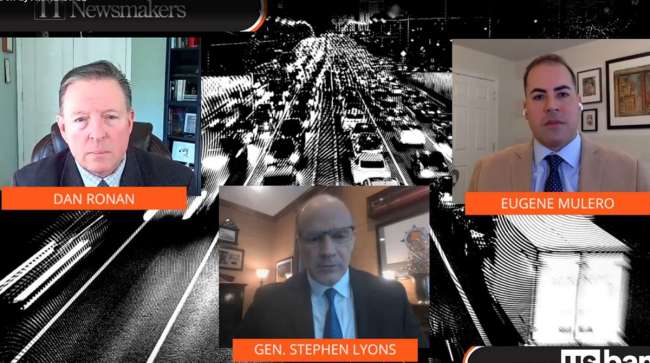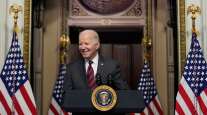Senior Reporter
White House Envoy Stephen Lyons Says Supply Chain Closing 2022 in Better Shape

[Stay on top of transportation news: Get TTNews in your inbox.]
White House Supply Chain Envoy Stephen Lyons says the nation’s supply chain is ending 2022 in a much better position than a year ago.
In 2021, there were concerns about shortages in stores and warehouses, rapidly rising prices to ship goods and thousands of containers stacking up at the nation’s ports as railroads could not move items fast enough.
“I always take people back to where we were a year ago,” Lyons, a retired four-star general, said in an exclusive interview for Transport Topics’ Newsmakers program. “We had 109 ships queued up outside of San Pedro Bay. Once we got past the chaos, the finger pointing, the significant monetary losses for many, the enormous profits for some, and the inflationary pressures that impact every consumer, it really did lead to a lack of confidence in the supply chain, and frankly for good reason. So, it’s important to reflect a little bit on what just happened. The truth is that record volumes of cargo moved through the supply chain, but it was ugly and it was chaotic.”
Just Announced: Retired General Stephen R. Lyons, former Commander of the U.S. Transportation Command, will be the new Port and Supply Chain Envoy to the Biden-Harris Administration Supply Chain Disruptions Task Force. https://t.co/gxMqNTXnJq — TransportationGov (@USDOT) May 27, 2022
Lyons said the economy recently dodged a potentially devastating problem when Congress in early December imposed a settlement on the nation’s 115,000 unionized railroad workers, who move freight from coast to coast and from Canada to Mexico.
“The railroads are running. Even with the congressionally enacted labor contract, there’s work to be done. Every senior executive in the railroad industry I’ve talked to acknowledges there’s really a lot of work to do to improve labor relations and improve global services. I’m convinced that the president and Congress made the right call keeping the railroads running for America,” Lyons said. “I had the opportunity to lead the interagency consequence management planning efforts. So I can tell you that the impacts of a disruption would have been dramatic for Americans and the economy. It would have been a real setback, and fortunately it did not happen.”
Appreciate the swift bipartisan action in Congress to prevent a devastating rail shutdown.
This deal will see well-deserved and long-overdue pay increases for rail workers. Meanwhile, we will continue to push for paid leave for all American workers. — Secretary Pete Buttigieg (@SecretaryPete) December 1, 2022
Lyons also is watching the labor negotiations between the Pacific Maritime Association, which represents the management of 29 West Coast port and warehouse operators, and the 22,000 members of the International Longshore and Warehouse Union. Those talks have been going on since summer, and the sides have promised not to conduct a labor action, either in the form of a strike or lockout, even as the contract expired months ago.
“The negotiations have resumed, and that’s what we want to see, the parties at the bargaining table making progress. I remain in close contact with the PMA and ILWU leadership,” he said. “Both parties have reiterated their commitment to reach a negotiated contract without disruption to the West Coast port operations. So I am pleased to report that, you know, freight is fluid. There’s no backlogs on the on the West Coast and that negotiations continue on, and we continue to monitor that closely.”
The union and the employer have agreed to not discuss negotiations in the media, and any rumors about what happens at the negotiating table are second, third or fourth hand. The union has no comment on unsourced rumors except to say that the parties continue to negotiate. — ILWU Coast Longshore Division (@ilwulongshore) August 19, 2022
Lyons moved into his position after Maryland transportation leader John Porcari established the job and held it for less than a year, navigating the supply chain challenges during the height of the COVID-19 pandemic. Lyons told TT that he probably will leave the Biden administration in the spring or summer. He believes the American people now have a much better understanding of the complexities of the supply chain and how the ports, railroads, trucking companies, warehouses and other shippers and receivers are so tightly interwoven.

Hosts Seth Clevenger and Mike Freeze mark 100 episodes of RoadSigns, which started off four years ago asking, "Autonomous: Who's Behind the Wheel of Tomorrow?" Now, see where trucking was in 2018 and where it's going in 2023. Hear a snippet, above, and get the full program by going to RoadSigns.TTNews.com.
“I am an optimist by nature, cautiously optimistic, always. I think the consumer demand will stay. I think imports will stay and continue to grow,” Lyons said. “I think the supply chain will continue to normalize itself and build back a level of reliability. … So I see a positive 2023 coming about.”
He said now the private sector and government must take the lessons learned in the pandemic and apply them as soon as possible. “I don’t know that anybody is going to build a supply chain of the future that is going to accommodate a pandemic that may or may not occur, you know, in a 50-year span,” Lyons said. “There does need to be some levels of resiliency. These are largely private sector-driven supply chains.
“There are some enormous inefficiencies, particularly at some major terminals and nodes. And I think we also uncovered some vulnerabilities in some of the supply chains. The market will correct itself, as it always does. We are also taking away some of the lessons that we know we have to consider to continue to push and understand and adjust.”
The full interview on TT’s Newsmakers series can be seen here.
Want more news? Listen to today's daily briefing below or go here for more info:




